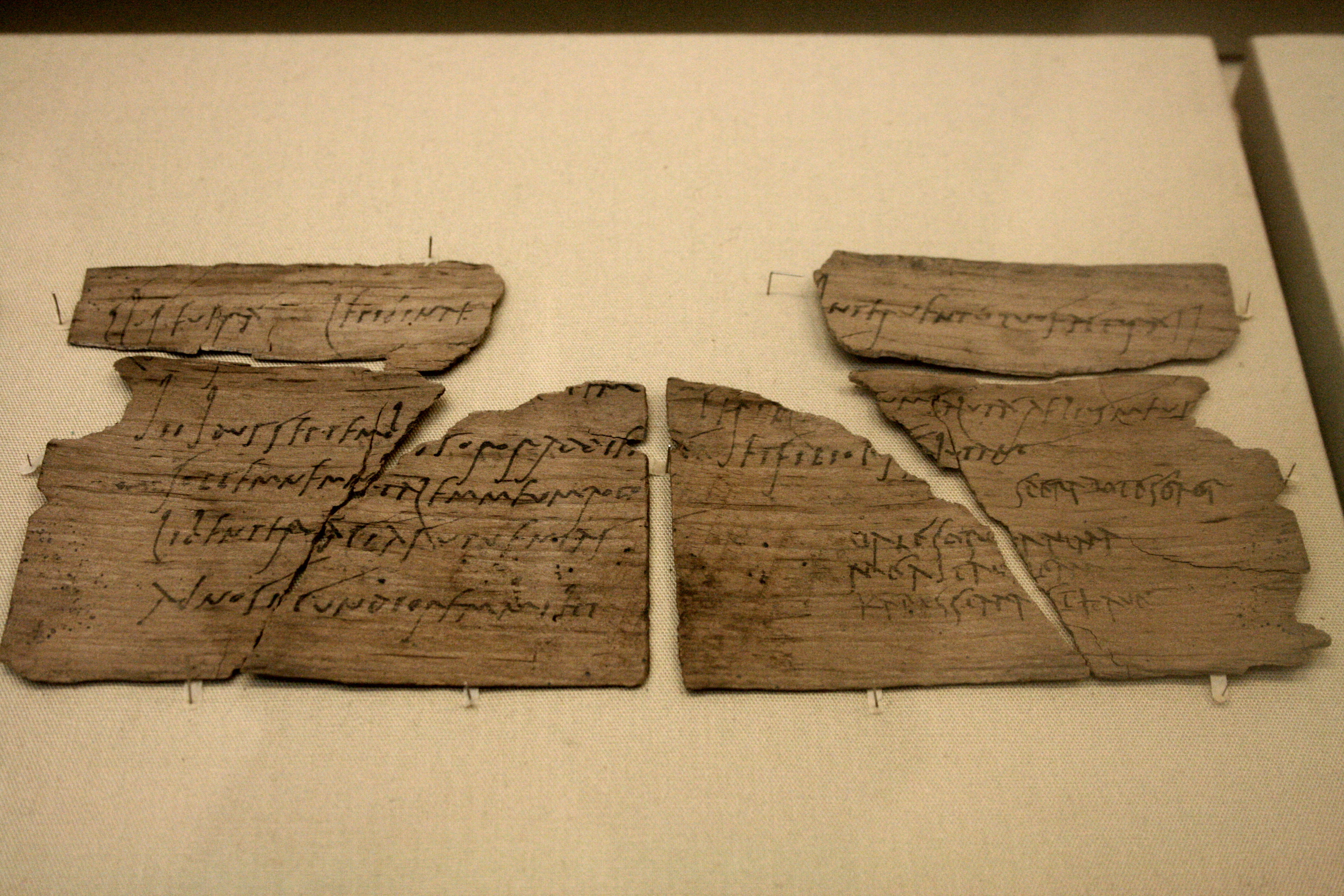Sulpicia Lepidina on:
[Wikipedia]
[Google]
[Amazon]
Sulpicia Lepidina was the wife of Flavius Cerialis,
 Sulpicia Lepidina received two letters from
Sulpicia Lepidina received two letters from
Vindolanda Tablets Online: Correspondence of Lepidina: tablets 291-294
{{DEFAULTSORT:Lepidina, Sulpicia 1st-century Roman women 2nd-century Roman women Ancient Romans in Britain Hadrian's Wall People from Northumberland Sulpicii
prefect
Prefect (from the Latin ''praefectus'', substantive adjectival form of ''praeficere'': "put in front", meaning in charge) is a magisterial title of varying definition, but essentially refers to the leader of an administrative area.
A prefect's ...
of the Ninth Cohort
Cohort or cohortes may refer to:
* Cohort (educational group), a group of students working together through the same academic curriculum
* Cohort (floating point), a set of different encodings of the same numerical value
* Cohort (military unit) ...
of Batavians, stationed at Vindolanda
Vindolanda was a Roman auxiliary fort ('' castrum'') just south of Hadrian's Wall in northern England, which it originally pre-dated.British windo- 'fair, white, blessed', landa 'enclosure/meadow/prairie/grassy plain' (the modern Welsh word ...
in Roman Britain
Roman Britain was the period in classical antiquity when large parts of the island of Great Britain were under occupation by the Roman Empire. The occupation lasted from AD 43 to AD 410. During that time, the territory conquered wa ...
in the early 2nd century AD. She is known from her correspondence, including a birthday invitation she received from Claudia Severa
Claudia Severa (born 11 September in first century, fl. 97–105) was a literate Roman woman, the wife of Aelius Brocchus, commander of an unidentified fort near Vindolanda fort in northern England. She is known for a birthday invitation she sen ...
.
Description
 Sulpicia Lepidina received two letters from
Sulpicia Lepidina received two letters from Claudia Severa
Claudia Severa (born 11 September in first century, fl. 97–105) was a literate Roman woman, the wife of Aelius Brocchus, commander of an unidentified fort near Vindolanda fort in northern England. She is known for a birthday invitation she sen ...
, wife of Aelius Brocchus, commander of a nearby fort. One of the letters from Severa is an invitation to a birthday party, which is perhaps the best-known of the Vindolanda tablets
The Vindolanda tablets were, at the time of their discovery, the oldest surviving handwritten documents in Britain (they have since been antedated by the Bloomberg tablets). They are a rich source of information about life on the northern fro ...
now at the British Museum
The British Museum is a public museum dedicated to human history, art and culture located in the Bloomsbury area of London. Its permanent collection of eight million works is among the largest and most comprehensive in existence. It docum ...
.
The invitation is partly written by a scribe and partly by Severa herself. Along with another tablet (a fragment with a closure written in Severa's hand), the invitation is thought to be the oldest extant writing by a Roman woman found in Britain, or perhaps anywhere. The subject-matter of the letters is social and personal, and Severa calls Lepidina her sister.
Sulcipia Lepidina also received a letter from another woman. While the name of the woman is difficult to read, the subject matter is legible. In this letter the woman, thought to be called Paterna, speaks either of remedies that she plans to bring to Lepidina, or else two ancillae Ancillae (plural) or ancilla (singular) was the term for female house slaves in the Ancient Rome, as well as in Europe during the Middle Ages.Judith M. Bennett & Amy M. Froide, Singlewomen in the European Past, 1250-1800'
Ancillae was the common ti ...
, enslaved girls, free from fever, are to be brought, one for Lepidina and one for someone whose name is lost from the text. The text of this tablet is too damaged to be able to determine which of these translations is correct.
The letters were written in ink on wooden tablets found during excavations at Vindolanda in the 1970s. Vindolanda was a Roman fort built where two streams conjoined and, as a result, the floors of the fort were thick with mosses, bracken and straw. The Vindolanda tablets were found in this thick carpet and filled-in ditches. Their preservation was due to the waterlogged soil conditions on parts of the Vindolanda site.
See also
*Sulpicia gens
The gens Sulpicia was one of the most ancient patrician families at ancient Rome, and produced a succession of distinguished men, from the foundation of the Republic to the imperial period. The first member of the gens who obtained the consu ...
Notes
References
External links
Vindolanda Tablets Online: Correspondence of Lepidina: tablets 291-294
{{DEFAULTSORT:Lepidina, Sulpicia 1st-century Roman women 2nd-century Roman women Ancient Romans in Britain Hadrian's Wall People from Northumberland Sulpicii